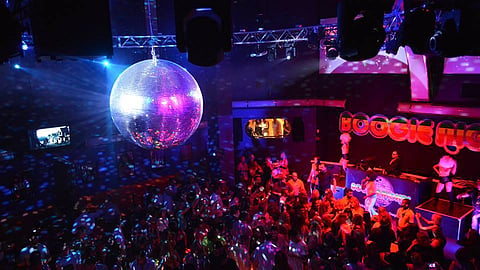In Atlantic City’s competitive dance-club scene, Boogie Nights uses the past to thrive in the present at the Tropicana
If there is one thing that defines the dance-club industry, it is an obsession with the new and now. What was cutting-edge nine months ago can be dated today. Which makes it nothing less than remarkable that Boogie Nights inside Tropicana Atlantic City has not just survived, but thrived using the same exact concept that it introduced a dozen years ago.
When Atlantic City-based nightlife impresario David Pena opened the original Boogie Nights in 2007 on the site of what used to be the Camelot steak house inside Resorts Casino Hotel, the idea was to recreate the glory days of dance clubs — the 1970s and ‘80s — not just through music selection, but through a complete immersion in the era via themed décor and staff costumes (as opposed to uniforms). While there have been some significant upgrades — most notably the 2014 move to the built-from-scratch, multi-million-dollar space off the Tropicana casino floor it now occupies — Pena and his minions have deviated from the original concept only by degree and only when alterations have been needed to keep things fresh for its large squadron of loyal customers.
So, what’s the secret to moving forward by standing still, as it were?
“I really believe that people just enjoy and love the music of that time period and the fashion and the style,” reasons Pena, 47, who refers to the club as “almost like Studio 54 meets Disneyland.” He adds he thinks “it's more of a celebratory spot. It's become an institution for people to party at.
“Nightclubs normally have a shelf life of maybe two or three years, whether it's New York, Philadelphia or Atlantic City. But Boogie nights has sort of stood the test of time because of the energy and the magic that we try to create. We make sure that every time you come walking into Boogie Nights, we’re always giving you what you're expecting.”
Despite the constant stream of promotions and entertainment offerings (including the Primal Men Male Revue, which is currently the every-Saturday-attraction), Pena, who also operates Boogie Nights outposts at Hollywood-branded casinos in Lawrenceburg, Ind. and St. Louis, as well as the Hard Rock in Biloxi, Miss. is under no illusions that his danceteria’s success exclusively emanates from his side of the equation. Instead, he is generous in his praise of the contributions he says both his clientele and staff make.
“I think it's really the customers,” he offers. “They bring the energy to the party because they dress up--they're encouraged to dress up. We got a lot of interesting characters that come walking in. I mean sometimes I look at the people in the audience or on the dance floor and think, ‘Do they work for us?’
“And we want to make sure that you walk away knowing that you had the best time of your life. And we go out of our way to make sure that that happens. That comes with a lot of interaction with our staff members, like meeting not only our bartenders and servers, but also our talent staff. Being able to create characters, create photo opportunities, makes an experience.”
Another aspect of Boogie Nights—which opens at 10 p.m. on Thursdays and 9 p.m. Fridays and Saturdays--that sets it apart from the AyCee dance hall pack is its eclectic playlist. The relentless, over-amped thump of electronic dance music (EDM) that is heard in other local discos is missing at Boogie Nights. Instead, guests shake their booties to a smorgasbord of genres, from classic ‘70s dance-pop (think Donna Summer and The Village People) to new wave and hair metal.
Another difference-maker is the room’s demographics. While its emphasis on baby-boomer and GenX nostalgia ensures an older crowd, Pena notes that millennials comprise a healthy slice of his market—a situation he claims doesn’t surprise him in the least.
“I'll say it flat out: The music then was absolutely better, and the new generation also understands that. There's a lot of great music out today, and hopefully, more will come. But [the ‘70s through ‘90s] really was the best time for music--rock, pop, disco--and fashion and pop culture in general.
“The music stands the test of time.”

